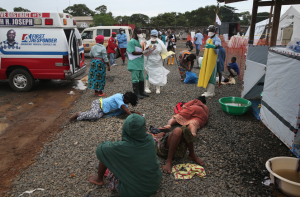The Obama Administration has officially imposed their first travel restrictions on passengers traveling into the US from the the heavy affected countries. As of right now, travelers from the affected countries can only fly into the five approved US airports that currently provide additional screening protocols in place. These protocols are designed to supplement exit screenings that take place in the majorly affected countries. The majorly affected countries include Liberia, Sierra Leone and Guinea. Currently the only airports that passengers from the affected countries will be able to fly into will be New York’s JFK International Airport, Newark International Airport, Washington DC’s Dulles International Airport, Atlanta’s Hartsfield-Jackson International Airport, and Chicago’s O’Hare International Airport. All passengers who have been in one of the three countries – Libera, Sierra Leone, and Guinea – in the last 21 days will only be able to enter the US through one of those five airports.
This is a major step in the US’s fight to handle and ultimately control the Ebola crisis that has plagued the globe. This move comes days after political pressure rose to an all time high to impose an all out ban for travel for passengers from the majorly affected countries. The screenings will be basic exams focusing on fever and the passenger’s face to question any possible exposure. The US will continue to evaluate the Ebola crisis very closely and will determine whether or not to add additional restrictions or screenings.
The are no current direct flights from the three majorly affected countries, so this will likely affect passengers coming from most foreign airports. Currently, the five airports that will serve as the hubs handle about 90% of foreign travel so it makes sense that they were chosen. The department of homeland security will continue to work closely with airlines to implement the restrictions and to create a seamless travel experience for passengers. Situations such as these normally cause major travel disruption, so any effort to minimize disruption will fare well with travelers. Additionally, the majority of travelers from the three aforementioned countries travel to those five cities.
US officials have claimed that at the moment they have no plans to impose wider travel restrictions or an all out ban. The majority of individuals in the US who were affected with the Ebola virus were individuals who have come directly into contact with the virus through bodily fluids such as vomit, blood, and sweat. Most of these persons included nurses and journalists. Ironically speaking, Rwanda recently imposed travel restrictions on travelers arriving from the US and Spain as those are the only two countries outside of the three majorly countries that have confirmed confirmed Ebola infections.
US officials will continue to monitor the situation as closely as possible for any updates.
For more related articles and news updates follow the Twitter page of Dominic Carter.
